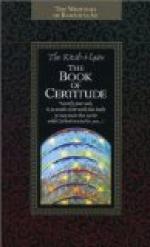Inasmuch as they have not apprehended the meaning of Knowledge, and have called by that name those images fashioned by their own fancy and which have sprung from the embodiments of ignorance, they therefore have inflicted upon the Source of Knowledge that which thou hast heard and witnessed.
For instance, a certain man,(141) reputed for his learning and attainments, and accounting himself as one of the pre-eminent leaders of his people, hath in his book denounced and vilified all the exponents of true learning. This is made abundantly clear by his explicit statements as well as by his allusions throughout his book. As We had frequently heard about him, We purposed to read some of his works. Although We never felt disposed to peruse other peoples’ writings, yet as some had questioned Us concerning him, We felt it necessary to refer to his books, in order that We might answer Our questioners with knowledge and understanding. His works, in the Arabic tongue, were, however, not available, until one day a certain man informed Us that one of his compositions, entitled Irshadu’l-’Avam,(142) could be found in this city. From this title We perceived the odour of conceit and vainglory, inasmuch as he hath imagined himself a learned man and regarded the rest of the people ignorant. His worth was in fact made known by the very title he had chosen for his book. It became evident that its author was following the path of self and desire, and was lost in the wilderness of ignorance and folly. Methinks, he had forgotten the well-known tradition which sayeth: “Knowledge is all that is knowable; and might and power, all creation.” Notwithstanding, We sent for the book, and kept it with Us a few days. It was probably referred to twice. The second time, We accidentally came upon the story of the “Mi’raj"(143) of Muhammad, of Whom was spoken: “But for Thee, I would not have created the spheres.” We noticed that he had enumerated some twenty or more sciences, the knowledge of which he considered to be




